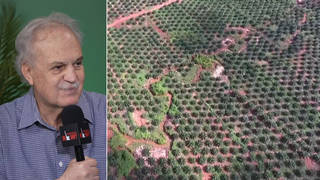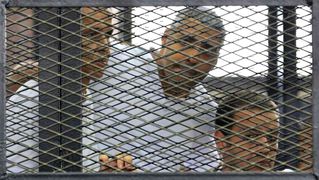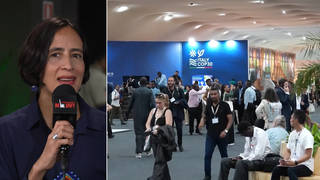
Topics
Guests
- Peter GresteAl Jazeera journalist who was imprisoned in Egypt for 400 days during a crackdown on Al Jazeera following the ouster of President Mohamed Morsi in 2013. He is a longtime foreign correspondent who worked at the BBC, CNN and Reuters before joining Al Jazeera. In 2011, he won a Peabody Award for a documentary on Somalia.
Egyptian President Abdel Fattah el-Sisi granted pardons to 100 people on Wednesday, including two jailed journalists from Al Jazeera—Mohamed Fahmy and Baher Mohamed. The two were initially arrested along with Australian journalist Peter Greste as part of a crackdown on Al Jazeera following the ouster of democratically elected President Mohamed Morsi in 2013 and served more than a year in prison. In a statement, Amnesty International said, “While these pardons come as a great relief, it is ludicrous that some of these people were even behind bars in the first place.” Fahmy, Mohamed and Greste were initially sentenced to between seven and 10 years in prison for terrorism charges including “spreading false news” in support of the Muslim Brotherhood, deemed a “terrorist group” by the Egyptian government. While Fahmy and Mohamed have been pardoned, no pardon has been issued yet for Peter Greste, who has traveled to New York to lobby for a presidential pardon while el-Sisi is attending the United Nations General Assembly. We speak with Greste about the pardons of his colleagues as he continues to seek a pardon for himself.
Transcript
AMY GOODMAN: Egyptian President Abdel Fattah el-Sisi granted pardons to 100 people Wednesday, including two jailed journalists from Al Jazeera—Mohamed Fahmy and Baher Mohamed. The two were initially arrested along with Australian journalist Peter Greste as part of a crackdown on Al Jazeera following the ouster of the democratically elected President Mohamed Morsi in 2013. To the shock of press freedom advocates, the three were initially sentenced to between seven and 10 years in prison. After over a year in jail, Peter Greste was released in February, deported home to Australia. Shortly afterwards, Fahmy and Baher Mohamed were also freed on bail. But then, in August, those two were sentenced—resentenced to three years in jail. Last week, Baher Mohamed described what it felt like to be finally pardoned.
BAHER MOHAMED: Finally, yes, after 411 days, it’s like a big rock was on your chest, and suddenly you moved it. So it was such a feeling—it’s hard to describe that moment. I was like jumping and jumping, like—and even I heard the word “release,” and that’s it, because the sound inside the cell, because the cell, as you know, it’s like with glass, surrounded with glass, so you can just hear almost the sound. So, it was amazing. I just can’t express. I kept jumping and jumping. I’m like, “Finally.”
I’m happy that I will return back, I will not stay in prison. I’m happy that I’m going back to my family, seeing my family and my kids. I just spoke to my wife and kids now. They were very happy that I’m returning home. This is something very beautiful and I really appreciate. And I’m willing to continue this for freedom of press.
AMY GOODMAN: In a statement, Amnesty International said, quote, “While these pardons come as a great relief, it is ludicrous that some of these people were even behind bars in the first place.” “While these pardons come [as a great relief],” they said, “it is ludicrous that some of these [people] were even behind bars in the first place.”
While Fahmy and Mohamed have been pardoned, no pardon has been issued yet for Peter Greste. He has come to New York to lobby for a presidential pardon while Egyptian President General Abdel Fattah el-Sisi is here attending the United Nations General Assembly. El-Sisi has also been invited by President Obama to attend the Leaders’ Summit on Countering ISIL and Violent Extremism taking place on Tuesday at the United Nations. Egypt claims it recently killed as many as 500 people in the Sinai Peninsula during an anti-militant offensive called Operation Martyr’s Right. Peter Greste joins us here in our studio, longtime foreign correspondent who has worked at the BBC, CNN and Reuters before joining Al Jazeera. In 2011, he won a Peabody Award for a documentary on Somalia.
Peter Greste, it’s a pleasure to have you here in our studio in New York.
PETER GRESTE: Thanks very much, Amy. It’s fantastic to be here.
AMY GOODMAN: You served over 400 days in prison in Egypt.
PETER GRESTE: Four hundred exactly, in fact.
AMY GOODMAN: And you got out of prison, you were deported to Australia. Explain what happened last week with your two Al Jazeera colleagues.
PETER GRESTE: What happened was that—one of the things that surprised us, in fact, was that when the retrial began—I was deported in a gap between our formal convictions and the start of the retrial process. Once the retrial began, we thought that I would—I was off the case. But I was in fact included in the retrial. I was on trial in absentia. The court officially didn’t recognize my deportation under presidential order. And so, we were all convicted a few weeks ago. Finally, we’ve—
AMY GOODMAN: And sentenced to another three years.
PETER GRESTE: Exactly, sentenced to another three years, convicted on terrorism charges. And then, last week, and much to everyone’s surprise—we really weren’t expecting it—the president formally pardoned, as you mentioned earlier, 100, about 100 prisoners, 100 detainees, including Fahmy and Baher. We were hoping that I and six other people who were also convicted in absentia in the first trial would also receive pardons. That hasn’t happened yet. And so, as you just mentioned, that’s why I’m here at the moment, to try and clear the names of all of those who were convicted in absentia.
AMY GOODMAN: Can you talk about what happened this weekend in the U.N.?
PETER GRESTE: Well, this weekend, we saw President Sisi speak. We saw quite a number of—we know there were a lot of—there was a number of meetings. We’ve seen quite a lot of attention focused on President Sisi—I take it this is what you’re talking about. And we’ve also been doing—having a number of conversations. I’ve been speaking to the Australian foreign minister, Julie Bishop, who has also spoken to her counterpart, her Egyptian counterpart. And everyone seems to be supporting us.
AMY GOODMAN: Now, just to understand, on Friday, when the pope addressed the General Assembly, didn’t your foreign minister, Julie Bishop, meet with the foreign minister in the presence of President el-Sisi?
PETER GRESTE: That’s right, it was in—it was in the presence of President Sisi. And so that’s why we—
AMY GOODMAN: And what did they say?
PETER GRESTE: Well, Julie Bishop, as she relayed the conversation, she said that Foreign Minister Shoukry said that the Egyptians were keen to try and find a solution to this, that they were looking favorably at the possibility of pardoning the journalists, but that they had several legal obstacles to overcome, and that, if necessary, they would—
AMY GOODMAN: What made you different from your two colleagues?
PETER GRESTE: The fact that we were convicted in absentia. As I understand it, the law doesn’t allow the president to pardon people who are in absentia, that we have to be present, physically present, in Egypt to apply for a pardon.
AMY GOODMAN: Are you planning to go back?
PETER GRESTE: No. No, we’re not. And, you know, I mean, in a way—
AMY GOODMAN: And you’re talking about another group of journalists who never served time in prison but were convicted in absentia.
PETER GRESTE: That’s right. In all, there were the three of us plus six others, who were all convicted—sorry, who were all charged in absentia in the first trial. They were unable to—well, they weren’t a part of the retrial, because, again, they’re not allowed to appeal if they’re not physically present. And so, they remain—those convictions remain for them.
And so, what we’re trying to do is get everybody off these charges. You know, this is—the fact is that we’re very grateful to President Sisi for pardoning Fahmy and Baher. It was an injustice that should never have happened, and I think President Sisi, in issuing those pardons, has made an implicit acknowledgment of that. But the fact is that that’s an extremely welcome first step. That was the thing that really has been bothering all of us. The one thing that we needed to happen was to have everybody out of prison. But I’m afraid that it’s not—it’s not everything. We need to finish this off, and that’s clear everyone else’s whose names are on this list.
AMY GOODMAN: What does it mean to say that you have not been pardoned? How does that affect you?
PETER GRESTE: Well, look, it affects—there are three big areas in this. The first is, is the usual problems that come with anybody who—confront anybody who’s been—who has a criminal record. This is a very serious criminal record. It’s a record on terrorism charges. As anybody knows, if you’ve got a criminal record, it makes travel very difficult. It was quite difficult for me to get into the United States.
AMY GOODMAN: What do you mean?
PETER GRESTE: Well, anyone who travels to the U.S. on an Australian passport generally gets in on a visa waiver program, but to do that, you have to answer an online questionnaire. And one of the questions is: Have you ever been arrested? And if you check that box, you have to explain the circumstances of the arrest. And, of course, I have to say that I was arrested and convicted on charges of aiding a terrorist organization, financing a terrorist organization, broadcasting false news to undermine national security, but please google me because it was—even President Obama spoke out in support of our case. So, you know, it raises all sorts of red flags for the bureaucrats that are processing these visas. We had to go and get special clearance from the State Department, from John Kerry’s office himself, to get that visa through. Now, it was never going to be a major problem, but it caused us a lot of bureaucratic headaches.
Other things, like getting bank loans and the like, are all problematic. Travel is a real headache. I want to—I’m trying to go to a number of countries. I work—I was working in Kenya before I was arrested. Kenya was my home. I was covering East Africa as East Africa correspondent for Al Jazeera. And again, the whole of the African Union has an extradition treaty. Now, the problem is that if we—if an arrest warrant is issued, then I’m liable to be arrested anywhere in the African Union and sent back to Egypt. Again, we don’t know that that warrant has been issued, but it—as far as I’m aware, it hasn’t, but that can be issued at anytime. And it’s kind of like a sword of Damocles hanging over my head.
But quite apart from those issues, the fact is that this case has become emblematic of the much wider issues over press freedom. And so, what we’ve been saying to the diplomats and to Egypt is that we need to see this finished off, because our cases had a very damaging effect, I think, on freedom of the press. Now, the Egyptians keep saying to us that this was never about the press, this was—about freedom of the press, they weren’t targeting the press specifically, they weren’t trying to send any message, this was simply about the facts of law. Whatever their motivations were, the fact is that it sent a very chilling message to any journalist that’s been operating in Egypt. And so, to have—if the press is going to operate freely, as is enshrined in the Egyptian constitution, then we need to get these charges cleared.
AMY GOODMAN: We’re talking to Peter Greste. He is free. He’s in our studio. He’s here in New York. He’s lobbying the Egyptian president, el-Sisi, for a pardon. When we come back, we want to talk about his time in prison and also those who remain behind bars, talk about overall press freedom. Peter Greste is an Al Jazeera journalist, imprisoned in Egypt for 400 days, covering the Egyptian revolution that took place. He was arrested during a crackdown on Al Jazeera during the ouster of President Mohamed Morsi in 2013. We’ll be back with him in a minute.












Media Options